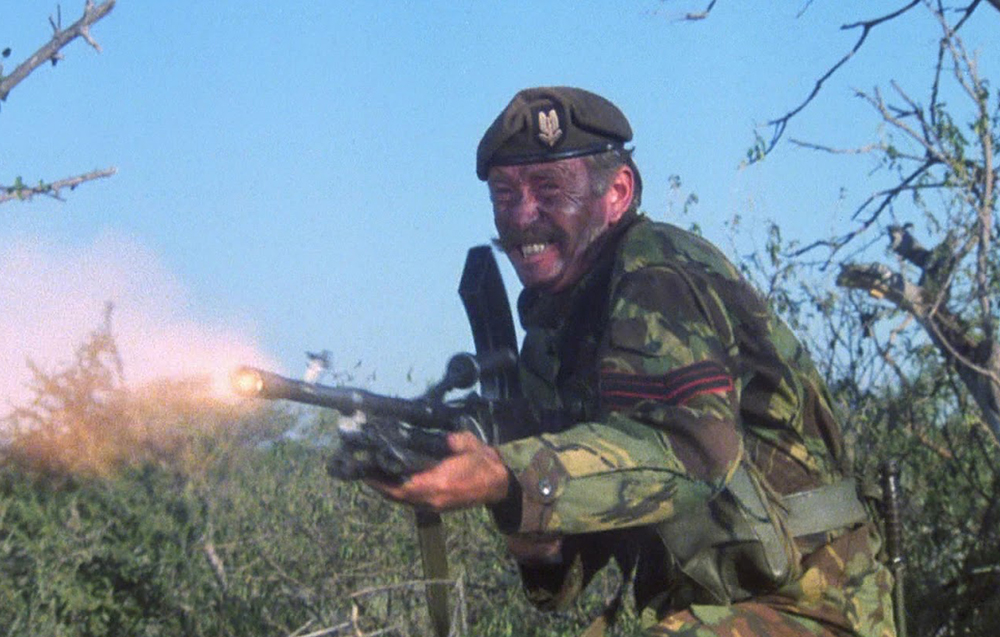Based on a best-selling book by Daniel Carney, “The Wild Geese” is the archetypal boy’s own adventure, a variation on “The Guns of Navarone” (1961) and “Where Eagles Dare” (1968).
Beginning in London, Hollywood hellraiser Richard Burton plays Allen Faulkner, a hardened, no-nonsense mercenary. Faulkner encounters Balfour (Barry Foster), a “fixer,” who introduces Faulkner to shady businessman Sir Edward Matheson, played with devilish charm by wartime heartthrob Stewart Granger.
Bringing Together a Solid Unit
Granger, who rose to fame in a string of Gainsborough Pictures in the 1940s, was in retirement by late 1970. However, in “The Wild Geese,” Granger hasn’t lost any of his charm and permits the suave and unscrupulous Matheson a steely dignity. Being fully aware that Faulkner is a gun for hire, Matheson offers Faulkner a dangerous proposition. In return for a substantial pay packet, Faulkner must rescue President Julius Limbani (Winston Ntshona), an imprisoned president of an African republic.
Faulkner begins to recruit his group of ageing mercenaries; he starts with tactics expert Rafer Janders (Richard Harris), who is reluctant to join the team. Janders states he’s “unavailable” and only wishes to spend time with his son, Emile (Paul Spurrier), on a family skiing trip in Switzerland.
Shawn Fynn is James Bond in army fatigues, with Moore clearly enjoying his role.”
The role of Janders was the trickiest part to cast; Hollywood heavyweight Burt Lancaster was originally cast in the role before Lancaster lobbied producer Euan Lloyd to expand his part. Irish born Richard Harris was swiftly cast, his craggy features and screen persona perfect for the role of Janders. Jander’s relationship with his son Emile and his long-standing friendship with Faulkner, in essence, becomes the heart of the film.

In Comes 007 — the Addition of Bond Actor Roger Moore
Shawn Fynn, who “can fly any plane you care to name,” is played by Bond actor Roger Moore, arguably at the peak of his career. Certainly, a more prominent name on the marquee, Moore, has less to do with the story than Burton and Harris. The screenplay by Reginald Rose offers Moore plenty of funny quips, with Burton and Harris carrying the plot.
In essence, Shawn Fynn is James Bond in army fatigues, with Moore clearly enjoying his role. Completing the star billing is German-born actor Hardy Krüger as South African mercenary Pieter Coetzee. Armed with a convincing accent and an interesting character arc, Krüger is excellent throughout the film.
‘The Wild Geese’ is an excellent entry into the subgenre of “Men on a Mission.”
Jack Watson plays Sergeant Major Sandy Young; he whips Faulkner’s’ fifty mercenaries into shape in a role originally earmarked for Stephen Boyd. The cast is also sprinkled with real-life mercenaries, adding a semi-sense of reality to the film, with Col. “Mad” Mike Hoare no less as a military advisor on the film.
Once the team have retrieved President Limbani, the film steps up a gear after a double-cross on a barren runway in the middle of Africa. Bond second-unit Director John Glen, an action specialist, provides “The Wild Geese” with plenty of explosions and desert warfare.
An Early Mercenary Film that Paved the Way for Others
Best known for making westerns with ageing Hollywood stars such as James Stewart and John Wayne, Director Andrew V. McLaglen moves the narrative along quickly. The climactic scene on the runway with a Dakota warming its engines is a violent shootout crammed with action — the best sequence in the film.
Shot on location in 1977 during the Apartheid in South Africa, “The Wild Geese” is an excellent entry into the subgenre of “Men on a Mission.” Many commentators have mooted the theory that “The Wild Geese” is a pre-curser to the grizzled mercenary films of Sylvester Stallone’s “Expendables” series.
‘The Wild Geese’ is a heady mix of suspense, comedy, drama, and action.
Unlike the more recent “Expendables” film series, all featuring over the hill beefcakes from the 1980s. “The Wild Geese” has its own expendables more suitably cast, with Burton, Moore, and Harris all playing their ages — no need in “The Wild Geese” for trivia-laden one-liners regarding past successes in other film franchises, something that in “The Expendables” series wears a little thin.
‘Wild Geese II’ Never Took Off, but Fond Remembrance for the Original
In the mid-1980s, there was a belated sequel to “The Wild Geese,” with parts offered to Burton and Moore. Still flying high as 007, Moore passed on the script, but Richard Burton agreed to play Faulkner once more; however, he would sadly pass away at the age of 58, just before filming began. Starring an elderly Laurence Olivier and “Day of the Jackal” star Edward Fox, “Wild Geese II” is more of a turkey than a wild goose and falls into the “it’s so bad it’s good” category of film genre.
“The Wild Geese,” however, is a heady mix of suspense, comedy, drama, and action. It’s dated, particularly in its politics, but still well worth seeing. Released in 1978, it was a big hit, and deservedly so; it’s a top-notch action film with a stellar cast.
“The Wild Geese” is currently available to stream on Tubi – Free Movies & TV, Peacock TV, Plex – Free Movies & TV, Prime Video, Midnight Pulp or FlixFling.
Support the Site: Consider becoming a sponsor to unlock exclusive, member-only content and help support The Movie Buff!